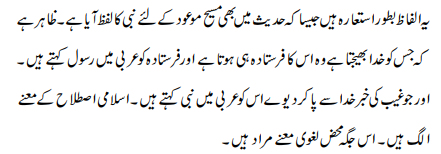Showing Islam is Peaceful • Tolerant • Rational • Inspiring
| Home
|
| 1.
Islam |
| 2.
Ahmadiyya Movement Hazrat Mirza Ghulam Ahmad Did not claim to be a prophet Word nabi used metaphorically as meaning ‘saint’ |
| 3.
Publications & Resources |
Words nabi and rasul used metaphorically as meaning ‘saint’According to Islamic authorities, the words nabi (‘prophet’) and rasul (‘messenger’) are not only used for actual prophets, as defined in Islamic terminology, but can also be applied in a metaphorical sense, or in the sense of their linguistic meaning, to someone who is not a prophet. These words can be, and have been, applied to some of the great saints of Islam, who were certainly not prophets, because they possessed some qualities of prophets such as communication from Allah (in the limited form in which it is promised to true believers by the Holy Quran and Hadith). A Muslim who is spoken to by God is known as a muhaddas . This is the term used by the Holy Prophet Muhammad himself, as given in Bukhari. Hazrat Mirza Ghulam Ahmad used these words nabi and rasul about himself in the way that they are used for Muslim saints, for someone who is a muhaddas, and he made it perfectly clear that he was not claiming to be a prophet. Hazrat Mirza Ghulam Ahmad’s detailed explanations of his use of these terms
Other statements by Hazrat Mirza Ghulam Ahmad:
|


